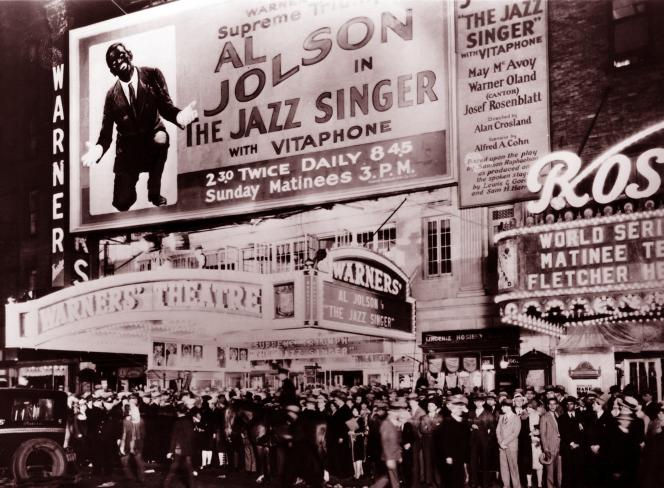It was at the time of the silent cinema, to which this film, which was also partially silent, made a spell. We named The Jazz Singerdirected in 1927 by Alan Crosland, produced by the Warner brothers, and scripted by Alfred Kohn, based on a play by Samson Raphaelson, himself a future screenwriter for Ernst Lubitsch and Alfred Hitchcock.
The film – which is being released in theaters as part of Warner’s 100th anniversary – has the particularity of being both a medium-scale artistic work and one of the most memorable titles in the history of cinema. Three reasons for this. It is the first sound film. This is the first musical. It is, finally, a valuable document on the inventory of fixtures of the integration of minorities in the American melting pot.
Jakie Rabinowitz (Al Jolson), son of a synagogue cantor in New York’s Lower East Side, aspires to become a jazz singer and performs clandestinely in bars. His father having banished him from the family home, Jakie tries to make a career under the name of Jack Robin, with the help of Mary (May McAvoy), an actress who falls in love with him. While he was to perform on Broadway for the premiere of a crucial show for his career, his tearful mother told him that his father, on the verge of death, could not perform the Yom Kippur service, one of the most important of the Jewish liturgy, and asks him to replace it.
Between fidelity to roots and individual emancipation, allegiance to tradition and desire for modernity, the film pretends not to choose. The hero will give up his singing turn, lead the Kol Nidre to the synagogue, before returning to the stage and becoming a star there. In truth, it is indeed the death of the father, guarantor of the tradition, which allows the conflict to be resolved, and the hero to free himself.
Prayer and show business
Emollient melody in an Ashkenazi environment – which induces a lot of pathos, a welcome touch of humor, and an incestuous neurosis between the son and the proudly exhibited mother –, The Jazz Singer is an exciting film in every respect. Firstly in that it is a living trace of the conflict experienced by American Jews, and more specifically by Hollywood Jews, between frenzied assimilationism and filial piety. Conflict resolved, in this film, on a pleasant pirouette, at the end of which the same tears and the same devotion bathe the synagogal cantillation and the trill of song, the vocation of prayer and that of show business.
Then because this internal debate – culminating in the very long scene where Jakie is torn between her good Christian friend who urges her to follow her path and her mother who urges her to replace her father at the synagogue – takes place while the he actor, in his dressing room, makes up his face in black for the purposes of his sung number.
You have 52.65% of this article left to read. The following is for subscribers only.
